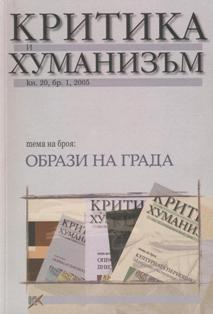Безобразното тяло и фетишът на неорганичното. Записки на един съвременен софийки фланъор
The disfigured body and the fetish of the inorganic. Notes by a contemporary flaneur from Sofia
Author(s): Boyan ManchevSubject(s): Cultural Essay, Political Essay, Societal Essay
Published by: Фондация за хуманитарни и социални изследвания - София
Keywords: fetish; inorganic; flaneur; Sofia; public space; transformation; critical intuition; resacralization; secular ethics; ontotheological transcendence; human rights; secular
Summary/Abstract: Could a walk of a contemporary flaneur in the city of Sofia become an exercise in critical thinking? Indeed yes, under the condition that it is an exercise in critical seeing. The critical thinker as flaneur or the contemporary flaneur as critical thinker? One thing is sure: both critical thinking and flaneur have emerged as emblematic practices of Modernity (to think but of Kant and Baudelaire), which cannot be dissociated from the modern concept of public space. What we call public space is, of course, one of the elements of Modernity. It opens in the universal horizon of secular values: it is impossible without the suppression of the inaccessible ontotheological transcendence and the establishment of the abstract but tangible space of the new secular universality: that of universal human rights, human reason and secular ethics. The starting hypothesis of this essay is that public space today undergoes a radical transformation. Today we witness the ongoing process of ‘resacralization’ of public space, happening through media, which were initially nothing else but the instruments of self-representation of the public space. The public space is being transformed in a new media space. In accordance with this critical intuition, the flaneur from Sofia exercises his seeing in discovering the symptomatic value of the monstrosity of the visual environment of his city: he sees it as a symptom of the radical transformation in question. But if the potential for transformation, or in other words, the technique, is the original condition of human being, than how to confront the actual transformation of public space – and should we confront it at all?
Journal: Критика и хуманизъм
- Issue Year: 2005
- Issue No: 20
- Page Range: 177-185
- Page Count: 9
- Language: Bulgarian
- Content File-PDF

